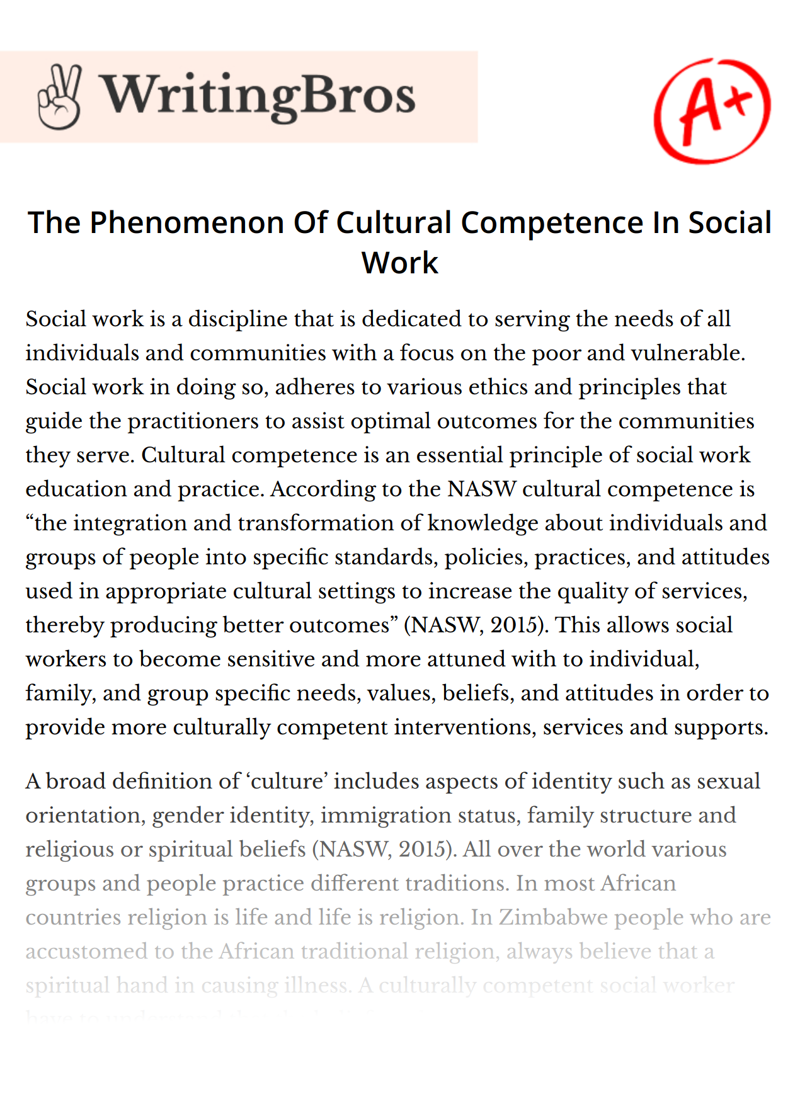The Phenomenon Of Cultural Competence In Social Work

Social work is a discipline that is dedicated to serving the needs of all individuals and communities with a focus on the poor and vulnerable. Social work in doing so, adheres to various ethics and principles that guide the practitioners to assist optimal outcomes for the communities they serve. Cultural competence is an essential principle of social work education and practice. According to the NASW cultural competence is “the integration and transformation of knowledge about individuals and groups of people into specific standards, policies, practices, and attitudes used in appropriate cultural settings to increase the quality of services, thereby producing better outcomes” (NASW, 2015). This allows social workers to become sensitive and more attuned with to individual, family, and group specific needs, values, beliefs, and attitudes in order to provide more culturally competent interventions, services and supports.
A broad definition of ‘culture’ includes aspects of identity such as sexual orientation, gender identity, immigration status, family structure and religious or spiritual beliefs (NASW, 2015). All over the world various groups and people practice different traditions. In most African countries religion is life and life is religion. In Zimbabwe people who are accustomed to the African traditional religion, always believe that a spiritual hand in causing illness. A culturally competent social worker have to understand that the beliefs and practices of ATR have an impact on their clientele. Every society has different ways of explaining and managing illness as well as ways of caring for the sick. In most African societies, illness attracts a religious and spiritual explanation. This implies that illness cannot just occur without a spiritual force (Mbiti,1969; Chavunduka, 2001).
According to Phillips, 2010, social workers are encouraged to embrace many ways of knowing especially when working with indigenous people. African traditional religious beliefs and practices are key in the process of indigenizing social work. Indigenisation is the extent to which social work fits local contexts (Gray, 2005). Social workers in ZImbabwe have pushed Indigenous Knowledge Systems (IKS) out of practice despite calls to indigenise the profession (Mabvurira, 2016). They have done so despite the recognition of African belief systems’ importance in illness management and in the health delivery system of Zimbabwe (Gelfand, 1975; Kazembe, 2009; Chavunduka, 2001; WHO, 2002). Despite the fact that there is increasing attention being given to the relationship between social work practice, culture and indigeneity in some parts of the world (Hodge & Derezotes, 2008; Baskin, 2002; Gray & Fook, 2004; Ross, 2010).
Examples of Shona traditional beliefs Includes:
Belief in avenging spirits – the belief in avenging spirits (ngozi) has been something that is common in the Shona traditional practices. It is of great importance for social workers to have a recognize such beliefs in the Shona. Social workers who practiceamong the Shona people should have an understanding of the different types of avenging spirits as these are thought to be responsible for social problems facing many people.
Possession of some familiar – This is closely related to witchcraft. It is done by individual as a ways to get rich but it will in turn affect family members e.g children. Chavunduka (2001) argues that people may possess these familiars to get rich but in the long run they may haunt other family members by causing illness. In as much as social workers may have to appreciate the traditional explanations for illness among indigenous African communities, they have to be careful as one illness may have many explanations on the same person. Social worker working in African communities must be in a position to discuss issues that deals with misfortune attributed to mystical beliefs among their client. Some times Western oriented measures and strategies are not effective in helping such clients. The social worker perspective should however include these African myths. A culturally compentant social worker should be in place to give his client a chance to share such matters.
Social workers who work in African communities should understand the role that religion plays especially to ancestors concerning illnesses. At times they may have to encourage their clients in ATR to perform certain rituals as a way to honour of their ancestors than discouraging them. This however may be a delicate endeavour as ATR is diminishing and social workers may be subscribing to other religions other than ATR. Social workers should be culturally competent and also be sensitive to the religious beliefs of all their clients. For the Shona, the spirit world has the power to cause illness. It is therefore imperative for social workers practicing in Zimbabwe to be familiar with the cultures of the main tribal groups. A social worker who may not be culturally competent may disagree with the client’s belief system and may therefore short change the clients.
Cite this Essay
To export a reference to this article please select a referencing style below

